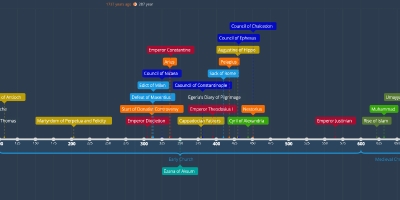1 Jan 451 Jahr - Council of Chalcedon
Beschreibung:
In 451 Emperor Marcian called the Council of Chalcedon to address the continued confusion and debate over the divine and human natures of Christ. The issue had continued to be controversial since the Council of Ephesus, and had been enflamed by the “Formula of Union,” a statement issued by Cyril of Alexandria (CE 375-444), claiming that the nature of man and the nature of God are united in one person, Jesus Christ. Cyril’s successor was an impetuous monk named Dioscorus (CE ) who sought to establish the unity of the Son by rejecting the two natures of Christ. He convinced Emperor Theodosius II to call a council to reverse the condemnation of a dull-witted monk who had claimed that there was one nature in Christ. In defense of two natures in Christ, Pope Leo wrote a lengthy letter called “The Tome” to be read at the council. When it was not read, Leo called the council the “Robber Council” and applied to the Emperor to call a new council. Leo, however, had to wait until Leo died and his successor, Emperor Marcian, was away at war. He then worked with Pulcheria, Marcian’s wife and Theodius II’s sister, to summon the Council of Chalcedon in 451. In the council itself, Dioscorus was removed from office and a statement was written that re-stated the Nicene Creed and then asserted the Theotokos and the two natures of humanity and divinity united in Jesus Christ, Son of God.Despite concluding the council, the statement generated would prove to be one of the most divisive documents in Church history. It causes the formation of three distinct groups. The Chalcedonians are the group that upholds all creeds made by the Ecumenical councils, Nicaea, Constantinople, Ephesus, and Chalcedon. The Homoians or Arians reject the Nicene Creed, and consequently, every subsequent council where it is re-affirmed. The Church of the East, the Nestorians, uphold the Nicene Creed and the statement of 2 natures from Chalcedon but reject the affirmation of Theotokos made at the Council of Ephesus. The Miaphysites are those that remain devoted to the one nature of Christ, so while they accept Nicaea, they firmly deny Chalcedon. The Miaphysites would continue to be a dominant strain of Christianity and were highly impactful in the spread of Christianity beyond the Roman Empire.
Zugefügt zum Band der Zeit:
Datum:
1 Jan 451 Jahr
Jetzt
~ 1575 years ago
